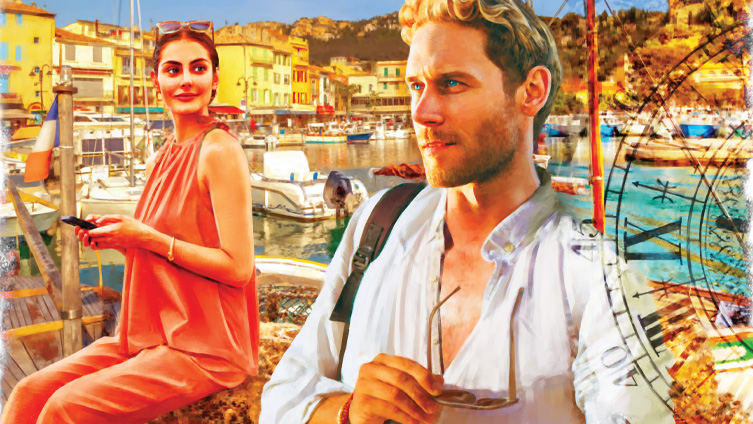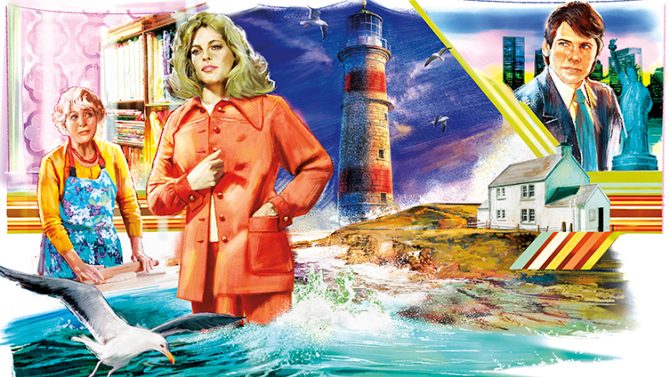All At Sea
Pascal had another job lined up before he took Nicole's family for a meal...

Illustration: Kirk Houston.
Subscribe to The People’s Friend! Click here
Pascal had another job lined up before he took Nicole's family for a meal...

Illustration: Kirk Houston.
CRIME SHORT STORY BY SUZANNE PUNTIS
Pascal had another job lined up before he took Nicole’s family for a meal…
Pascal strolled across the rutted cobbled square and stopped to gaze at the fountain.
Frothy brown scum floated amidst the ice-cream wrappers.
The tourists arrived each summer, leaving trails of litter in their wake.
It was scorching hot and the air was still.
He felt uncomfortable in his white linen shirt, faded denims and scuffed trainers.
His blue eyes shone beneath a crop of unkempt blond hair.
Fluttering pigeons and a scrawny stray mongrel were the only forms of life.
Dusty shutters were closed and washing hung in courtyards and alleys.
Patches of cement rendering were missing on various external house walls.
He was supposed to meet Nicole at the market, but it was now early afternoon and she would be at home.
He left the square and took a narrow street that led to the waterfront.
The vessels were tied up against the quay and the fisherman lay sprawled beneath their cockpit awnings, in amongst the empty beer bottles.
The Mediterranean was azure blue and the bay looked like a typical brochure print, advertising yet another French resort.
On the hill to the west of the bay was the small resort: white concrete apartment blocks perched above the marina.
All the gift shops lining the quay were shut.
The only traders were the ice-cream vendors and the plump, bronzed Frenchman selling fresh strips of coconut, caramelised peanuts and melon slices.
A local portrait artist was sketching in charcoal. It was early in the season.
A few pink bodies lay strewn on the sandy beach.
Pascal had witnessed many identical summers.
It was only recently that he no longer idled his days away – swimming, water skiing and drinking cheap wine in the back street cellars and cafés.
He’d spent many hot summer nights sleeping beneath the stars, to awake parched and dizzy in the morning sun.
Pascal smiled at his recollections, then skirted the bay in an easterly direction, panting a little as he began his ascent to the top of the road.
Nicole lived in the top flat over a small antiques shop, which contained mostly worthless junk.
Her flat, with its peeling paint, was small and cramped.
He was feeling flippant and flung open the front door into the hallway.
The connecting door was open.
Nicole was curled up in the hanging chair in the corner in the cool shade.
He gave her a broad grin and tossed the keys on to the table, together with the bread, ripe camembert and Burgundy.
She gave him a sulky glance.
“Why didn’t you come to meet me from work?” she demanded.
I had to meet someone. I lost track of the time . . .
He was economical with the truth and she knew it.
There was always a list of pathetic excuses; then the apology came later that night, when they had both drunk a good deal of wine.
She seemed to have grown accustomed to his sudden swings in mood, just as she accepted her surroundings.
The bare boards, the threadbare rug, the faded tatty quilt, the painted cabinet – it was all she had.
They had been introduced by her brother’s oldest friend.
Pascal thought she was lovely in every way, though she sometimes appeared to be somewhat secretive about her past.
She swung to and fro, dangling one leg in the cane chair.
He grabbed the chair and it bumped to a halt.
He bent towards her and caught the pungent aroma of fish from her oily apron.
Her dark hair had partially fallen out of the metal pins and he gently unravelled it.
“So, where have you been?” she probed.
“Oh, just out and about. Someone had to get the groceries, didn’t they?”
“Ah, yes. Quite a larder full!” she retorted.
But she giggled.
She couldn’t keep it up. She couldn’t be stern with him.
It was half past five in the morning when Pascal awoke to the smell of coffee and hot croissants, which drifted from the little adjacent kitchen.
Nicole was preparing breakfast.
He caught glimpses of her through the open door.
She was in a blue towel, barefoot with her hair in a towel. She had to be at the market by six.
“Why the quizzical look?” she implored.
“Just thinking.” he replied.
“About what?”
“I’ve got to leave for a couple of days. I have some work on a small sea-going vessel. I’ll be back tomorrow night. Then, with my pay, we can take your family to the waterfront for a meal.”
“Picking up lobster pots again?” Nicole asked.
“Yes.”
“Going far?”
“Some distance,” he replied, not looking at her, but at a rather mangy white cat sitting in the walled courtyard below.
“You’re leaving this morning, then,” she mused.
“Yes, at about seven.”
She was dressing as they spoke and rubbing her long hair dry at intervals.
He watched her dart down the uneven concrete steps and out into the brilliance of the warm morning sun.
She’d gone. He slowly gathered up the breakfast things, which he piled in the ceramic sink, and straightened the bed.
What was he doing? He felt a bit queasy, yet he recollected the reason.
He glanced about the room and felt ashamed of what he saw.
He slammed the door shut and walked towards the quay with a scruffy holdall slung over his left shoulder.
On reaching the quay, he saw Pierre sitting on the cabin roof, splicing two thick warps.
He looked the same as always.
As Pascal descended the wrought-iron ladder fixed to the quayside wall, Pierre signalled to him.
Pascal acknowledged him with a nod and nimbly leapt aboard.
Pierre was tall and powerfully built, with a weathered tan.
He was also a good 10 or 12 years older than Pascal.
“It’s a beautiful morning, Pierre,” Pascal observed.
“Yes, but the weather has been changing the last couple of days.”
He looked up at Pascal and realised that his remark had had little impact on his shipmate’s ego.
He knew that Pascal’s enthusiasm ruled his head.
“There’s coffee brewing below. Help yourself.”
Pascal went below. The wooden hull of the Taboo creaked.
He returned with two tin mugs of strong black coffee.
They both sat in silence, drinking and gazing out towards the hazy horizon.
Once the coffee was finished, they set to work, stowing water, supplies and diesel for the old Lister engine.
Just before seven, the engine coughed into life, with the exhaust burning blue smoke.
The 15-metre cabin cruiser slowly chugged out of the harbour, towards the mouth of the bay.
Pierre stood at the wheel.
It was dusk the following day when the Taboo chugged towards the harbour entrance.
They headed up the deep-water channel to where the fishing vessels were moored along the sea wall.
Pascal was standing on the bow, unravelling the warps, with fat fenders hanging on the port side.
Pierre cut the revs of the diesel engine and expertly guided the Taboo into a space.
Pascal was feeling tired from the routine of spending four hours on watch, then four hours off, as well as the physical exertion and adrenaline.
He was just in the act of stowing an unused can of grease in a locker when a familiar voice called from the top of the wall.
“Hello – been lobster-pot fishing, have we?” Nicole’s father asked, gesturing to the baskets. “Any objection to my coming aboard?”
Pierre threw a quick glance to Pascal, but continued checking the diesel level.
“You’d better ask the skipper,” Pascal called back.
Pierre responded with a nod and a grunt of consent.
Just our luck, Pascal thought. Now we are duty bound to make small talk, when all we want to do is secure the boat, lock up and go out for something to eat.
For a man of his age, Nicole’s father negotiated the iron ladder with surprising agility.
He jumped the gap to the deck.
I noticed some smoke belching from her
he told them.
Without any further observations, he went below deck and undid the latches that secured the engine cover.
He carefully slid it to one side and leaned the engine cover against the bunk.
It didn’t require much of a search to discover what the problem was.
As the trio walked along the top of the sea wall, Pascal caught sight of Danielle at the far end of the quay.
She was holding her mountain bike and wearing shorts and a T-shirt.
She had obviously been distracted when Nicole’s father had begun heading for the boat.
He should have known better than to trust her.
Perhaps the town’s community were better informed in their gossip than Pascal had realised.
Nicole was nowhere to be seen.
He knew now the enormous consequences of his risk taking. He had deceived Nicole from the outset.
He’d used her because of who her father was.
Nicole’s father led the way to his office on the waterfront.
Once inside, the Customs official took the bulky packet from his jacket pocket and slit it open with a large gutting knife.
He didn’t need to be told that it – and dozens more – contained illegal narcotics.
In the intense heat, Nicole passed the shop front and wearily mounted the steps to her flat.
Life never seemed to deliver what she wanted from it.
Heartbroken, she’d come close to being embroiled in a police enquiry, as both Pierre and Pascal had been detained and were facing serious prosecutions.
Fortunately, her police statement, detailing that she had no prior knowledge or involvement, was believed.
It was the shock she needed!
Having subsequently signed up with the French Navy, she was leaving soon for Toulon.
She would train with the Marine Nationale, working on the offshore and coastal patrol vessels.
Inspired by her younger brother, Henri, who had died of a drug overdose the previous year, she had decided to do something about the illegal drug runners.
She was starting again in order to make a real difference in the world.
However, what the authorities had failed to realise was that she had deliberately set out to ensnare Pascal.
She wanted to avenge the person partly responsible for Henri’s death.
Now she was committed to continuing the work legally.
Below her flat was the broken, walnut-grained grandfather clock, which had been the magnificent centrepiece in the antiques shop window.
A rich American had arrived late in the season and announced, “Gee, I must have it!” in spite of the exorbitant price tag.
Another French antique exported.
No-one in the town could afford to buy it – but that was a taboo subject.
Enjoy exclusive short stories every week within the pages of “The People’s Friend”. On sale every Wednesday.

Deborah Siepmann


Alison Carter


Teresa Ashby

Beth Watson

Alyson Hilbourne

Katie Ashmore

Kate Hogan

Liz Filleul

Beth Watson

Alison Carter